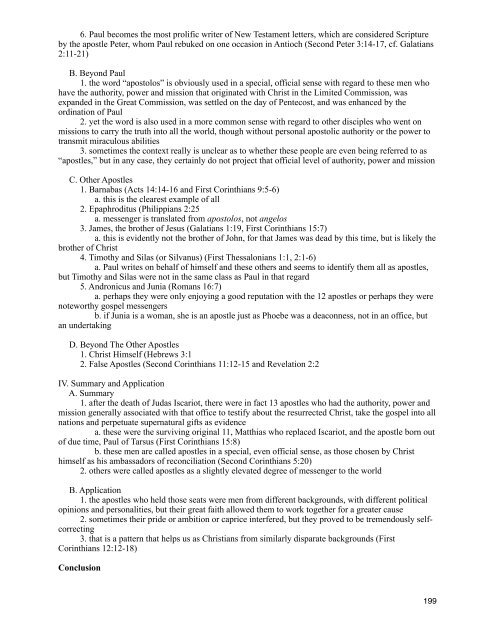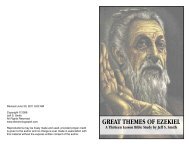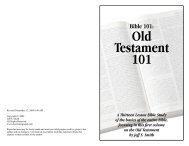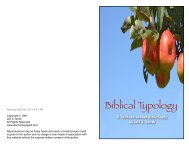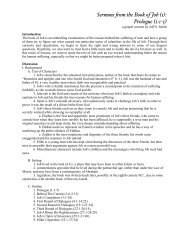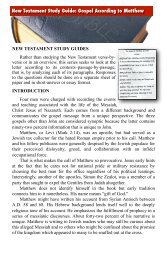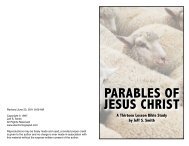Christ3. they have the mission to take the gospel into all the world as witnesses of the resurrectedII. A Special OfficeA. Founding the Church1. as they wait with the other disciples in Jerusalem, Peter suggests that a twelfth apostle be selectedto replace Judas Iscariot, who committed suicide after betraying Jesus (Acts 1:15-26)a. Matthias was chosen by miraculous lots over Joseph Barsabas Justusb. this is the only apostolic seat that was ever filled by succession following the death of theholder, for it was the only office prophesied to contain a betrayerc. other apostles die in the course of recorded New Testament history, but the Bible is silentabout filling their seats2. on the day of Pentecost, the 12 had assembled together when Christ’s promise of power wasfulfilled as the Holy Spirit descended upon each of these delegates and empowered them to speak to themasses of people in their own languages, in spite of the fact that the apostles were all uneducatedGalileans (Acts 2:1-21)a. Peter preached to them and convicted thousands, some of whom participated in the executionof their own saviorb. the keys of the kingdom were in use and the door had swung open to admit these penitentsinners who repented and were baptized into Christc. the position of the 12 apostles also emerges in these early days, even before they have takenthe gospel beyond the boundaries of Judea (Acts 2:42-43d. it is clear that there are 12 apostles at this point and no moreB. Breakdown of the Apostles1. Simon Peter was the outspoken and impetuous apostle who always seemed to be close to Christand at the center of attention and even conflict2. Andrew, Peter’s brother, seems to be far more reserved than his sibling3. James, the son of Zebedee, was nicknamed a son of thunder by Christ4. John, the son of Zebedee, was his brother and another son of thunder5. Philip was from Bethsaida and invited Nathanael to come and see if anything good could comeout of Nazareth6. Bartholomew simply appears in every list of apostles7. Thomas is the one who gets most of the notoriety for doubting that Christ has been resurrected8. Matthew, also called Levi, was a tax collector, who cooperated with the Roman government9. James was the son of Alphaeus10. Judas Iscariot was the disciples’ dishonest treasurer and Christ’s betrayer11. Thaddaeus was also called Lebbaeus or Judas, not Iscariot12. Simon the Zealot was part of a party that sought to expel the Gentiles from JudahIII. Beyond the 12A. Paul of Tarsus1. the apostles were witnesses of the resurrected Christ and the selection of a thirteenth apostlemade him a witness in an astounding manner (Acts 9:1-9)a. a preacher named Ananias taught Paul and baptized him for the remission of sins (Acts22:12-16) and then told him that his mission would make him a delegate of Christb. he becomes known as the apostle Paul, and has the same authority, power and mission as the122. some of this can be seen from his meeting with the other apostles (Galatians 2:1-2, 7-10)3. beyond working his own miracles, Paul shows the same power as the other apostles by passingon such abilities to others, something that ordinary disciples could not replicate (Acts 19:1-6)4. and he asserts his apostolic authority as well (First Corinthians 9:1-5, Second Corinthians 12:125. although some apparently disputed his claim to the office, he denied that he took it withoutauthority, being “an apostle (not from men nor through man, but through Jesus Christ and God the Fatherwho raised him from the dead)” (Galatians 1:1)198
6. Paul becomes the most prolific writer of New Testament letters, which are considered Scriptureby the apostle Peter, whom Paul rebuked on one occasion in Antioch (Second Peter 3:14-17, cf. Galatians2:11-21)B. Beyond Paul1. the word “apostolos” is obviously used in a special, official sense with regard to these men whohave the authority, power and mission that originated with Christ in the Limited Commission, wasexpanded in the Great Commission, was settled on the day of Pentecost, and was enhanced by theordination of Paul2. yet the word is also used in a more common sense with regard to other disciples who went onmissions to carry the truth into all the world, though without personal apostolic authority or the power totransmit miraculous abilities3. sometimes the context really is unclear as to whether these people are even being referred to as“apostles,” but in any case, they certainly do not project that official level of authority, power and missionC. Other Apostles1. Barnabas (Acts 14:14-16 and First Corinthians 9:5-6)a. this is the clearest example of all2. Epaphroditus (Philippians 2:25a. messenger is translated from apostolos, not angelos3. James, the brother of Jesus (Galatians 1:19, First Corinthians 15:7)a. this is evidently not the brother of John, for that James was dead by this time, but is likely thebrother of Christ4. Timothy and Silas (or Silvanus) (First Thessalonians 1:1, 2:1-6)a. Paul writes on behalf of himself and these others and seems to identify them all as apostles,but Timothy and Silas were not in the same class as Paul in that regard5. Andronicus and Junia (Romans 16:7)a. perhaps they were only enjoying a good reputation with the 12 apostles or perhaps they werenoteworthy gospel messengersb. if Junia is a woman, she is an apostle just as Phoebe was a deaconness, not in an office, butan undertakingD. Beyond The Other Apostles1. Christ Himself (Hebrews 3:12. False Apostles (Second Corinthians 11:12-15 and Revelation 2:2IV. Summary and ApplicationA. Summary1. after the death of Judas Iscariot, there were in fact 13 apostles who had the authority, power andmission generally associated with that office to testify about the resurrected Christ, take the gospel into allnations and perpetuate supernatural gifts as evidencea. these were the surviving original 11, Matthias who replaced Iscariot, and the apostle born outof due time, Paul of Tarsus (First Corinthians 15:8)b. these men are called apostles in a special, even official sense, as those chosen by Christhimself as his ambassadors of reconciliation (Second Corinthians 5:20)2. others were called apostles as a slightly elevated degree of messenger to the worldB. Application1. the apostles who held those seats were men from different backgrounds, with different politicalopinions and personalities, but their great faith allowed them to work together for a greater cause2. sometimes their pride or ambition or caprice interfered, but they proved to be tremendously selfcorrecting3. that is a pattern that helps us as Christians from similarly disparate backgrounds (FirstCorinthians 12:12-18)Conclusion199
- Page 1:
CharacterStudiesby Jeff S. Smith
- Page 5:
Character StudiesThe goal of these
- Page 8 and 9:
2. she points backward to his defea
- Page 10 and 11:
2. Jesus knew he was not an oversiz
- Page 12 and 13:
6! Jeff S. Smith
- Page 14 and 15:
2. when the local church is involve
- Page 16 and 17:
10! Jeff S. Smith
- Page 18 and 19:
D. No Luther1. it fell to the apost
- Page 20 and 21:
14! Jeff S. Smith
- Page 22 and 23:
c. is the antithesis of Diotrephes
- Page 24 and 25:
2. and then he rebukes him for his
- Page 26 and 27:
20! Jeff S. Smith
- Page 28 and 29:
2. before gaining his victory over
- Page 30 and 31:
II. Practical ApplicationA. A Lesso
- Page 32 and 33:
a. we are all bending over so easil
- Page 34 and 35:
ConclusionJoseph was faithful to Go
- Page 36 and 37:
a. that, I think, is the great maje
- Page 38 and 39:
a. he had to leave his home, where
- Page 40 and 41:
34! Jeff S. Smith
- Page 42 and 43:
3. when Isaac became old and blind,
- Page 44 and 45:
II. Man’s New BeginningA. The Old
- Page 46 and 47:
1. every time the gospel is preache
- Page 48 and 49:
4. Elijah now has his turn, once th
- Page 50 and 51:
44! Jeff S. Smith
- Page 52 and 53:
a. we, like they, are strangers and
- Page 54 and 55:
D. Deliverer Appointed1. when God s
- Page 56 and 57:
50! Jeff S. Smith
- Page 58 and 59:
. those with little would be moved
- Page 60 and 61:
. in one fell swoop, he takes out a
- Page 62 and 63:
56! Jeff S. Smith
- Page 64 and 65:
3. it is not that some earn God's f
- Page 66 and 67:
60! Jeff S. Smith
- Page 68 and 69:
C. The Pleasures of Sin Are Passing
- Page 70 and 71:
64! Jeff S. Smith
- Page 72 and 73:
3. reaching our land of milk and ho
- Page 74 and 75:
68! Jeff S. Smith
- Page 76 and 77:
1. he believed, but he was not yet
- Page 78 and 79:
72! Jeff S. Smith
- Page 80 and 81:
1. we must know the Bible and be ab
- Page 82 and 83:
76! Jeff S. Smith
- Page 84 and 85:
2. David took care to respect the p
- Page 86 and 87:
a. if he complains about having to
- Page 88 and 89:
. later in life, we see Herod Antip
- Page 90 and 91:
84! Jeff S. Smith
- Page 92 and 93:
2. this Aaronic priesthood executed
- Page 94 and 95:
88! Jeff S. Smith
- Page 96 and 97:
4. that more acute, more spiritual,
- Page 98 and 99:
D. His Defense (cf. Acts 7:1-50)1.
- Page 100 and 101:
94! Jeff S. Smith
- Page 102 and 103:
A. Concern For Others, Even Servant
- Page 104 and 105:
98! Jeff S. Smith
- Page 106 and 107:
II. Some ApplicationsA. Their Chara
- Page 108 and 109:
102! Jeff S. Smith
- Page 110 and 111:
8. afterward, Pilate permitted Jose
- Page 112 and 113:
106! Jeff S. Smith
- Page 114 and 115:
D. A Student1. the eunuch is in fac
- Page 116 and 117:
110! Jeff S. Smith
- Page 118 and 119:
a. it was no more a blessing to dwe
- Page 120 and 121:
114! Jeff S. Smith
- Page 122 and 123:
D. His Palace1. Nebuchadnezzar’s
- Page 124 and 125:
118! Jeff S. Smith
- Page 126 and 127:
language, creating different tongue
- Page 128 and 129:
122! Jeff S. Smith
- Page 130 and 131:
4. Naomi returns in deep bitterness
- Page 132 and 133:
126! Jeff S. Smith
- Page 134 and 135:
. it is not hard to imagine that th
- Page 136 and 137:
130! Jeff S. Smith
- Page 138 and 139:
C. Pointing at The Antichrist1. a f
- Page 140 and 141:
134! Jeff S. Smith
- Page 142 and 143:
Sufficient cause for the unpopulari
- Page 144 and 145:
138! Jeff S. Smith
- Page 146 and 147:
2. and so the wisdom of the magi wa
- Page 148 and 149:
142! Jeff S. Smith
- Page 150 and 151:
courier it to Paul and it became to
- Page 152 and 153:
146! Jeff S. Smith
- Page 154 and 155: illions of souls from benefiting is
- Page 156 and 157: 150! Jeff S. Smith
- Page 158 and 159: 17:15-21)2. the birth was announced
- Page 160 and 161: 154! Jeff S. Smith
- Page 162 and 163: . Thomas insisted that he would onl
- Page 164 and 165: 158! Jeff S. Smith
- Page 166 and 167: 2. first, he becomes the epitome of
- Page 168 and 169: 162! Jeff S. Smith
- Page 170 and 171: esteem, wondering what we will do w
- Page 172 and 173: 166! Jeff S. Smith
- Page 174 and 175: its soothing aroma and pain-relievi
- Page 176 and 177: 170! Jeff S. Smith
- Page 178 and 179: 3. this is the last that we hear of
- Page 180 and 181: 174! Jeff S. Smith
- Page 182 and 183: and both began to return once he wa
- Page 184 and 185: 178! Jeff S. Smith
- Page 186 and 187: led to the execution of innocent Na
- Page 188 and 189: 182! Jeff S. Smith
- Page 190 and 191: government or of an occupying power
- Page 192 and 193: 186
- Page 194 and 195: to cooperate with her scheme; how c
- Page 196 and 197: 190
- Page 198 and 199: 1. literal slavery like the kind th
- Page 200 and 201: 3. when Lot chose to live in Sodom,
- Page 202 and 203: 196
- Page 206 and 207: 200
- Page 208 and 209: a. he is frequently described as a
- Page 210 and 211: 204
- Page 212 and 213: II. Some ApplicationsA. Prodigies a
- Page 214 and 215: a. the other bureaucrats turned him
- Page 216 and 217: 21:20-25)a. it is safe to say that
- Page 218 and 219: 212
- Page 220 and 221: Ittai)b. as much as he hated what h
- Page 222 and 223: 216
- Page 224 and 225: II. Some ApplicationsA. Decisive Th
- Page 226 and 227: or friendship at all (First John 3:
- Page 228 and 229: c. Antipas was part of the tennis m
- Page 230 and 231: 224
- Page 232 and 233: 3. Silas begins and ends his Bible
- Page 234 and 235: 26Brown, Driver, Briggs and Geseniu


